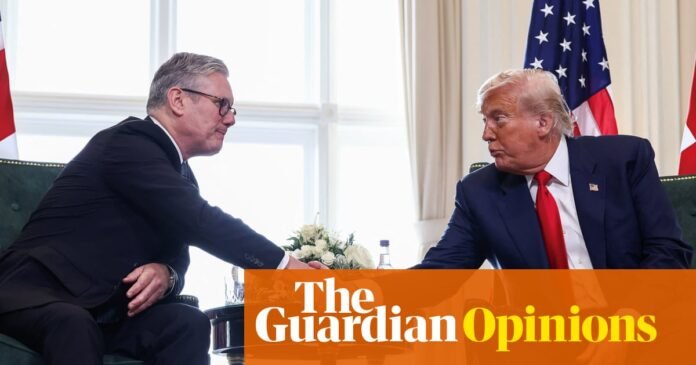If there is one thing that has marked the first year of Keir Starmer’s premiership, it is a propensity for control – whether it’s managing his own party, cracking down on civil liberties and protest, or instilling fear and anxiety in marginalised groups. For a centre-left party, the authoritarian strain Starmer has shown isn’t exactly in line with the “change” from the Tories that was promised.
Governments seek to control populations, politicians seek to control their parties: this is nothing new and has been explicitly promoted since Machiavelli’s The Prince was published in 1532. When leaders understand holding power as an end in itself, and see the method as controlling those they have power over, they block themselves from being able to bring about real change, because not “losing control” becomes more important than any change they seek to create. And attempting to tightly control outcomes is ill suited to an increasingly complex and unstable world.
At the same time, a different mode of control exists across the institutions that implement government policy. It is rules-based, promoted by steeply hierarchical structures fostering compliance, with rigid frameworks and inflexible mindsets, alongside a culture of overconfidence. These dynamics might seem benign or indeed necessary for a functioning bureaucracy. However, if out of balance, they can stifle the creative thinking and collaboration required to tackle complex challenges. Whether it is running consultations without the intention of deep engagement or listening, or an inability to incorporate the climate crisis into economic frameworks, by seeking to maintain control, institutions fall short of making meaningful change.
Or to put it bluntly, key performance indicators and top-down thinking, combined with overzealous control freakery in government, will not have a chance of tackling climate breakdown, the cost of living crisis, the mental health epidemic or the loss of trust in politics. This situation of overlapping crises is what academics like to call a polycrisis, characterised by radical uncertainty and wicked complexity.
Coming out of the pandemic, there has been increased discussion among policymakers recognising the need to acknowledge uncertainty. The value of this is clear: a report commissioned by the European Environment Agency and published in 2002 examined more than 100 years of policymaking, highlighting areas where uncertainty was not sufficiently acknowledged or taken into account when key decisions were made, such as during the BSE crisis. The authors concluded that, on many occasions, what was missing was the need for more humility in public policymaking about what was not known, stating: “Decision-making is faced with the continual prospect of surprise. This is the condition formerly known as ignorance.” When institutions don’t acknowledge what they don’t know, they are left exposed and unprepared, and leaders obsessed with control and certainty block themselves from taking seriously differing perspectives. These dynamics are not well suited to a world that is being upended, with fascism and ecological collapse on our doorstep.
However, the need for certainty and control isn’t confined to the halls of power. Across psychology, neuroscience, philosophy, evolutionary biology and strands of spirituality, it is recognised that our brains are wired for certainty. Neuroscience studies show that the brain responds to uncertainty as a fear-based threat, triggering the threat response centre called the amygdala. There is an evolutionary survival reason for this, to detect and react to danger: “How will I protect myself if I don’t know what’s coming at me?” Humans’ over-alert threat response is also shaped by culture and society. We have a political-media establishment that is happy to pump out ready opinions that are not only factually baseless and untrue, but also provoke our threat response. And in times of economic decline and uncertainty, there is an opportunity for far-right groups to hijack and trigger emotional and psychological reactions towards marginalised groups. When imaginary fears are adopted and promoted by those in power, this isn’t a mistake: it is a way to control.
The dominant mode of power that continues to operate in society, and certainly in the Labour party today, is “power over”, which is built on control, domination and coercion. Leadership exerts pressure and stress, which can often make our amygdala threat response fire off. People become paranoid and go into overdrive trying to control everything. To an extent, I understand these responses. As an overconfident 27-year-old when I took on a director role, I certainly had an urge to control everything. I had to work hard against that tendency in order to lead in a collaborative way. The phrase “holding uncertainty” was useful for me, because it meant I didn’t always trust my first reaction in situations, or the narratives my brain was telling me. It reminded me to take on board different opinions, rather than simply dismiss them. Of course I made mistakes, but I was also open to examining my own controlling and perfectionistic tendencies.
“Embracing uncertainty” or “letting go” has been mostly limited to the pages of self-help books, but letting go on an individual level doesn’t make sense if you can’t pay your rent, or your family is getting deported. However, if we apply it to our institutions, power centres, systems and structures, it can be a direction of travel against authoritarianism, moving us towards co-creation, pluralist thinking that goes beyond siloed categories, and building coalitions against the far right. We are a quarter of the way through this century, and the IPCC climate change report says that global temperature increase could be up to 5.7C by 2100, making much of the world unliveable. At the same time, fascism is on the rise. Renewing our democracies, shifting to a healthier culture, tackling the climate crisis and reorienting the economy will only happen if we shift our culture and institutions away from control. We need to let go. What have we got to lose?





